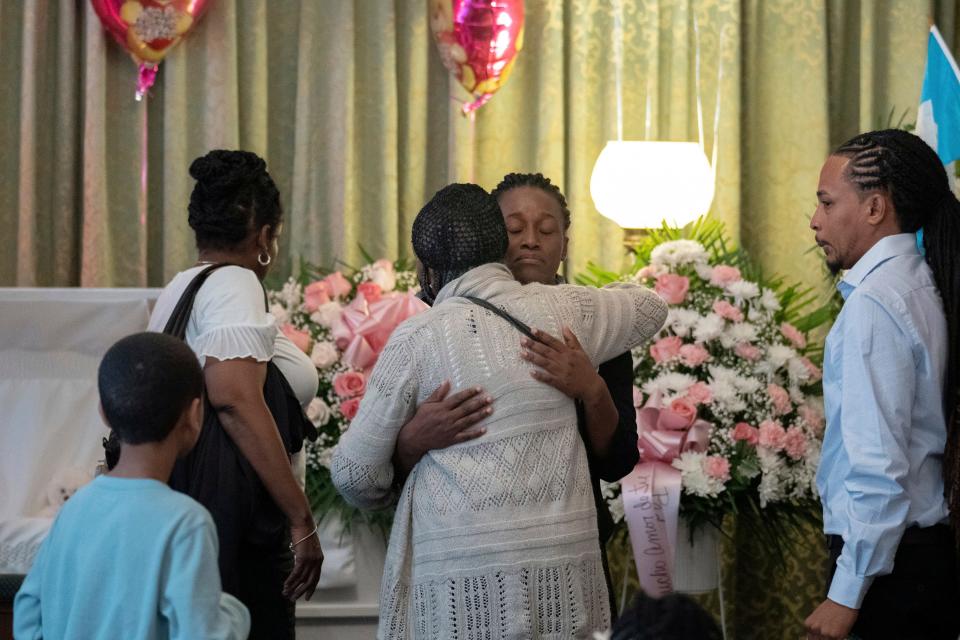An 8-year-old died in Customs and Border Protection custody. CBP must stop failing kids.
As a pediatrician, parent and president of the American Academy of Pediatrics, there is no more tragic occurrence than the death of a child, especially one that was preventable, as was the case with the death of 8-year-old Anadith "Ana" Danay Reyes Álvarez last month in Customs and Border Protection custody.
Ana was seen 11 times by medical personnel before she died. As a child with sickle cell disease and a heart condition, which were disclosed as part of her health history when she and her family arrived in Texas, Ana’s symptoms should have immediately set off alarm bells for medical personnel and border patrol agents.
Instead, after being dismissed by a nurse practitioner four times for requesting an ambulance for her daughter, it was not until the fifth time, as Ana lay nearly lifeless in her arms, that her mother’s anguished, urgent request for hospital transport was granted.
By then of course it was too late. Ana was pronounced dead at the hospital on May 17, just over a week after she arrived in the United States.

Make Customs and Border Protection facilities safer for children
While Customs and Border Protection has been more forthcoming about details surrounding Ana’s death than after the tragic deaths of multiple children in CBP custody in the prior administration, the agency’s specific and systemic failures warrant a reckoning. We cannot continue to tolerate weaknesses that have been well-documented in CBP facilities and expect a different outcome.
Improper clinical decision-making was most certainly a factor and one that was made worse by children and families spending longer periods of time in CBP facilities – days and weeks instead of hours.
The American Academy of Pediatrics has repeatedly said that because conditions at CBP facilities are inconsistent with AAP recommendations for appropriate care and treatment of children, children should not be subjected to them.
Immigration crisis: Biden wants us to believe the border is prepared for end of Title 42. Anyone buying that?
For years, AAP has urged Department of Homeland Security and CBP leadership – including as recently as last month – to take specific actions to make CBP facilities safer for children. I provided several of those recommendations personally after visiting CBP facilities in McAllen, Texas, one year ago. We have implored DHS to appoint a pediatrician as chief medical officer so that someone with expertise and training in the unique needs of children is creating policy and informing protocols.
Like many who have read the details of Ana’s untimely death, I sit in disbelief and anguish. I also firmly believe that a tragedy like this can and will occur again unless DHS and CBP take immediate and comprehensive actions to address the many systemic weaknesses that allowed Ana’s death to occur.
Children's deaths shine spotlight on CBP failures
We call for a full, transparent and public investigation of Ana’s death and the personnel and processes in place while she was in custody. In addition, the experiences and circumstances while in CBP custody of Angel Eduardo Maradiaga Espinoza, a 17-year-old who died in the custody of the Department of Health and Human Services’ Office of Refugee Resettlement, must also be investigated.
We need to know whether critical and potentially lifesaving medical information was and is routinely being shared by CBP with the refugee office and among key personnel within CBP facilities – as well as whether the continued confiscation of medication from children by CBP played a role.
Opinion alerts: Get columns from your favorite columnists + expert analysis on top issues, delivered straight to your device through the USA TODAY app. Don't have the app? Download it for free from your app store.
Ana’s death shines a spotlight on continued failures within CBP to ensure adequate medical care for children in their custody. Dr. Paul Wise, an independent juvenile care monitor and pediatrician, has made numerous recommendations that, if fully implemented, could have prevented this and potential future tragedies.
Dr. Wise’s previous public court filing calls for increases in medical provider teams, addressing deficiencies in medical assessments, especially for children in families who are in custody for longer than five days, and a review of medication protocols as well as all cases of children experiencing serious medical conditions while in CBP custody.
Growing up undocumented: I belong here: What it's like to grow up without DACA in Arizona
Medical care provided to children while in CBP custody must be communicated to the family members they arrived with or, in the case of unaccompanied children, to the refugee resettlement office and ultimately to the parent or relative whom they reunite with.
Specifically, Dr. Wise recommends a comprehensive reassessment of CBP capabilities to provide trauma-informed care and a child-friendly environment. What I saw a year ago were jail-like conditions and severely insufficient numbers of caregivers for children on site.
Until DHS commits to sweeping and urgent accountability and addresses systemic weaknesses, what happened to Ana will undoubtedly happen to another child.

The American Academy of Pediatrics is dedicated to the health and well-being of all infants and children, no matter where they or their parents were born.
It’s time for the federal agencies who interact with immigrant children to carry out that same mission.
Sandy Chung, MD, FAAP, is the president of the American Academy of Pediatrics.
You can read diverse opinions from our Board of Contributors and other writers on the Opinion front page, on Twitter @usatodayopinion and in our daily Opinion newsletter. To respond to a column, submit a comment to letters@usatoday.com.
This article originally appeared on USA TODAY: All children deserve healthcare. So why are kids dying in CBP custody?

